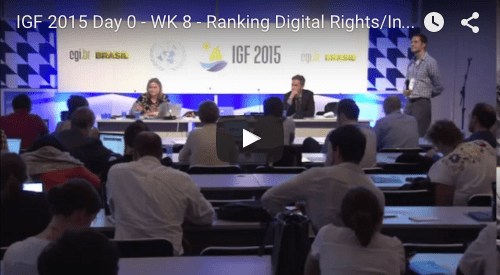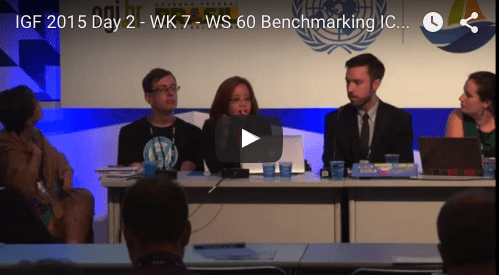After a series of launch events in the U.S., the RDR Corporate Accountability Index took to the global stage earlier this month as members of the RDR team presented the Index’s results at the Internet Governance Forum, an opportunity to engage with civil society advocates, researchers, government officials and private sector representatives from around the world. We received feedback on the project, and brainstormed about future activities with potential partners and collaborators
Reactions to the Index were positive. Several people commented on the painstakingly detailed approach to data collection and analysis. This is data one can stand behind. Most of the critiques could be summarized as “do more of the same… much, much more.” More companies, more services, in more markets… which of course requires more resources than the project currently possesses, but we are working on it…
Another common concern is that the Index measures disclosed policies and practices but does not take the next step to verify whether companies are actually carrying out the policies and practices that they describe. We also lack the resources to do such work, which would require on-the-ground staff in many countries. Instead, we welcome researchers and advocates to develop projects that would carry out the verification work in a globally distributed way: it would be ideal if a multitude of advocacy groups and academic institutions could develop their own approaches to verify and track how companies’ policies and practices are actually experienced by users in different parts of the world.
We also learned more about similar yet complementary projects that approach the same issue — corporate responsibility to respect human rights online — from different angles. If this ecosystem can seem like a messy patchwork at first glance, the conversations that RDR participated in highlighted the importance of collaboration between projects. As Carolina Botero, of Colombia’s Fundación Karisma, shared during our Day 2 workshop, being able to tell representatives from domestic Internet service providers that transparency reporting is now a standard practice that global giants like Google and Facebook routinely engage in was key in changing the tone of the conversation, which had been rather confrontational until then.
Day 0: Brainstorming Session
On “Day 0” of the conference devoted to self-organized events by conference attendees, RDR and Internews held a research and advocacy brainstorming session around the newly released Corporate Accountability Index. What additional research projects could emerge from the Index data, and how can the Index support advocacy?
Following opening remarks by David Kaye, the UN’s Special Rapporteur on Freedom of Expression, and a presentation of the Corporate Accountability Index, the Ranking Digital Rights team engaged the participants in a wide-ranging discussion of the Index, its potential for both research and advocacy, and also its limitations.
Participants rightly pointed out that while this evaluation of 16 companies is a commendable start, future iterations of the Index (ideally on an annual basis) will have greater impact if they include a wider range of companies, including more of the companies’ direct competitors. This, of course, is contingent on a combination of successful fundraising and on forging partnerships with civil society groups around the world. All of Ranking Digital Rights materials’, including our methodology and research guidance, are freely available under Creative Commons licensing, and we encourage our colleagues in the digital rights space to consider applying the RDR criteria to a wider range of companies and subsidiaries, for example by doing regional or country-specific rankings.
A thornier limitation is that because it only evaluates publicly available information (for reasons documented here), the Index cannot address the issue of company practices that diverge from their stated commitments. While there is a clear need to highlight this kind of disparity where it exists, our research has revealed that it is much more common for companies to simply not have a policy in place, or to have a an internal policy that users and the general public have no access to. We believe that RDR can best promote greater corporate accountability for human rights by incentivizing companies to develop and make public policies surrounding commitment to human rights, privacy and freedom and expression. Once companies make public commitments and disclosures, it is then possible for stakeholders to hold them accountable by verifying that they are living up to their commitments and actually adhering to their own stated policies. One project aiming to highlight companies’ actual practices is the recently launched OnlineCensorship.org, where users are able to submit their experiences with content takedown and other online censorship. Lumen (formerly Chilling Effects) allows users to upload information about take-down requests and receive information about their legal rights.
Day 2: Benchmarking ICT companies on digital rights
On Day 2 of the IGF, Rebecca MacKinnon participated in a roundtable workshop on “Benchmarking ICT companies on digital rights,” which I moderated. The participants’ experiences point to the diversity of strategies that can be effective in getting companies to improve their respect for digital rights: from star-based ratings like the EFF’s Who Has Your Back? and Fundación Karisma’s ¿Dónde están mis datos? to the RDR Index’s granular scoring system, there is more than one way to encourage ICT companies to respect human rights. The Transparency Reporting Index maintained by Access Now is formidable resource for activists from a wide variety of subsectors, providing links and brief descriptions for the transparency reports of more than 50 global companies. The Terms of Service & Human Rights project translates the “legalese” that these documents are usually written in into plain language that users can understand, thus empowering them to make informed decisions about the services they use. It is clear that these projects, and others, rely on and support one another. All human rights advocacy is an ecosystem to an extent, but this is all the more true when we’re dealing with multinational corporations whose actions impact users all over the world in different but related ways.
Comments by Cecille Soria of Democracy.Net.PH and Kelly Kim of Open Net Korea reinforced the importance of starting with a low bar and raising it gradually. While both Democracy.Net.PH and Open Net Korea would eventually like to start ranking projects using the RDR criteria, the reality is that many companies in their respective countries do not currently provide the kind of information that the Index’s methodology seeks to surface. Even though the South Korean company Kakao stood out for its relatively robust disclosures in the RDR Index, Kim said Korean companies still have considerable progress to make. Open Net Korea plans to focus on getting companies to publish regular transparency reports before scrutinizing the contents of those reports. This echoed the earlier comments from the EFF’s Jeremy Malcolm, who noted that the Who Has Your Back? report has gradually raised the bar for the companies it evaluates.






